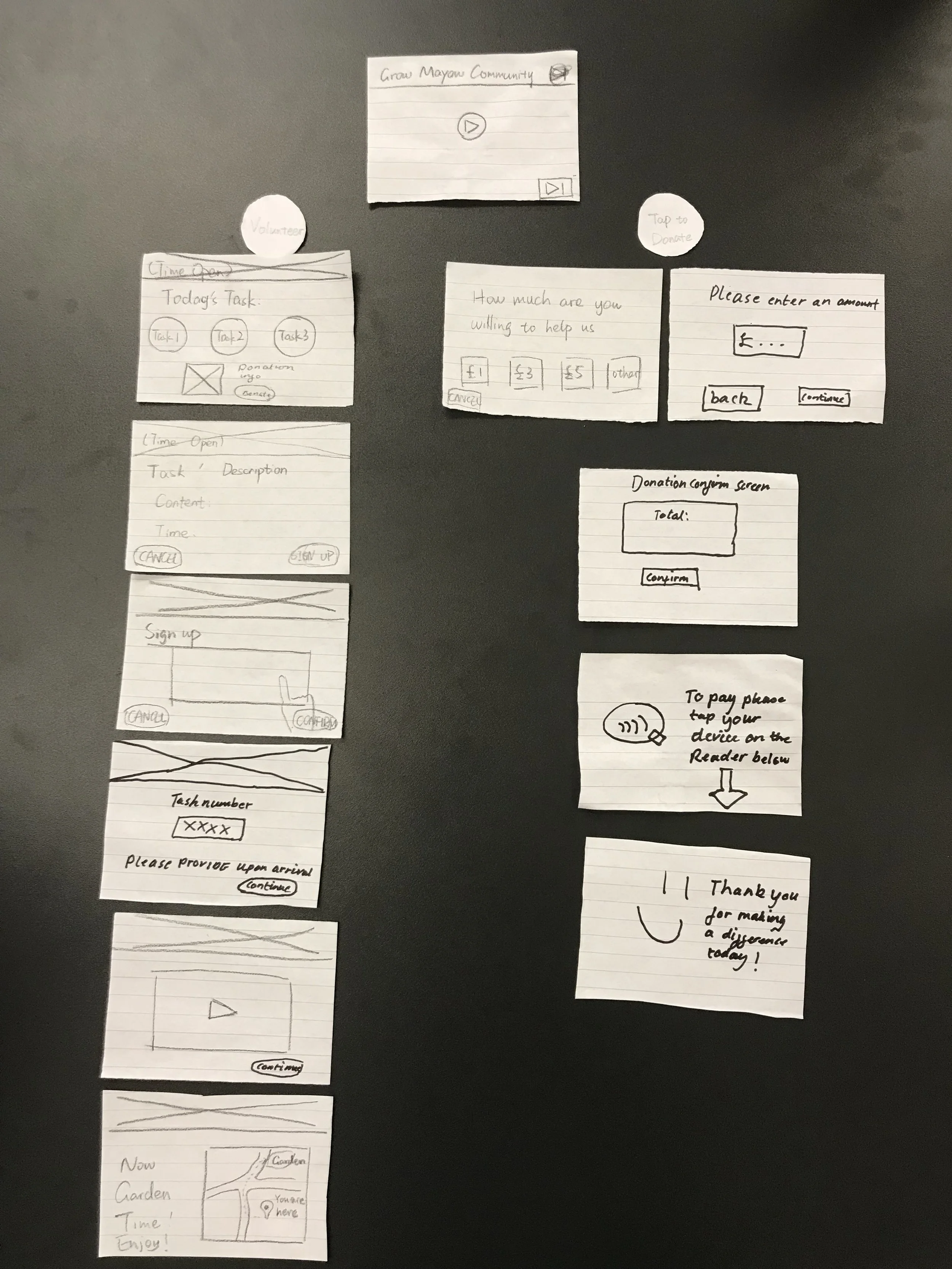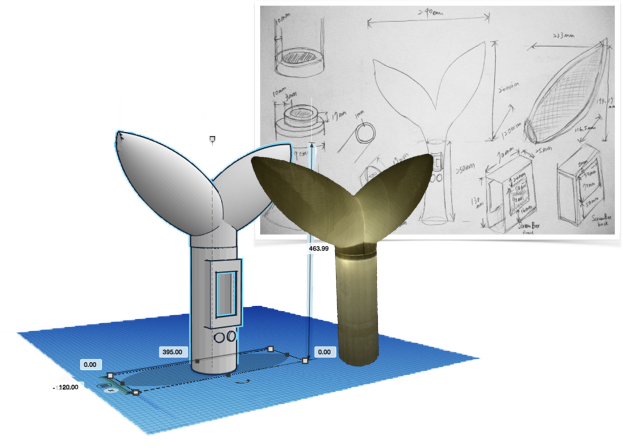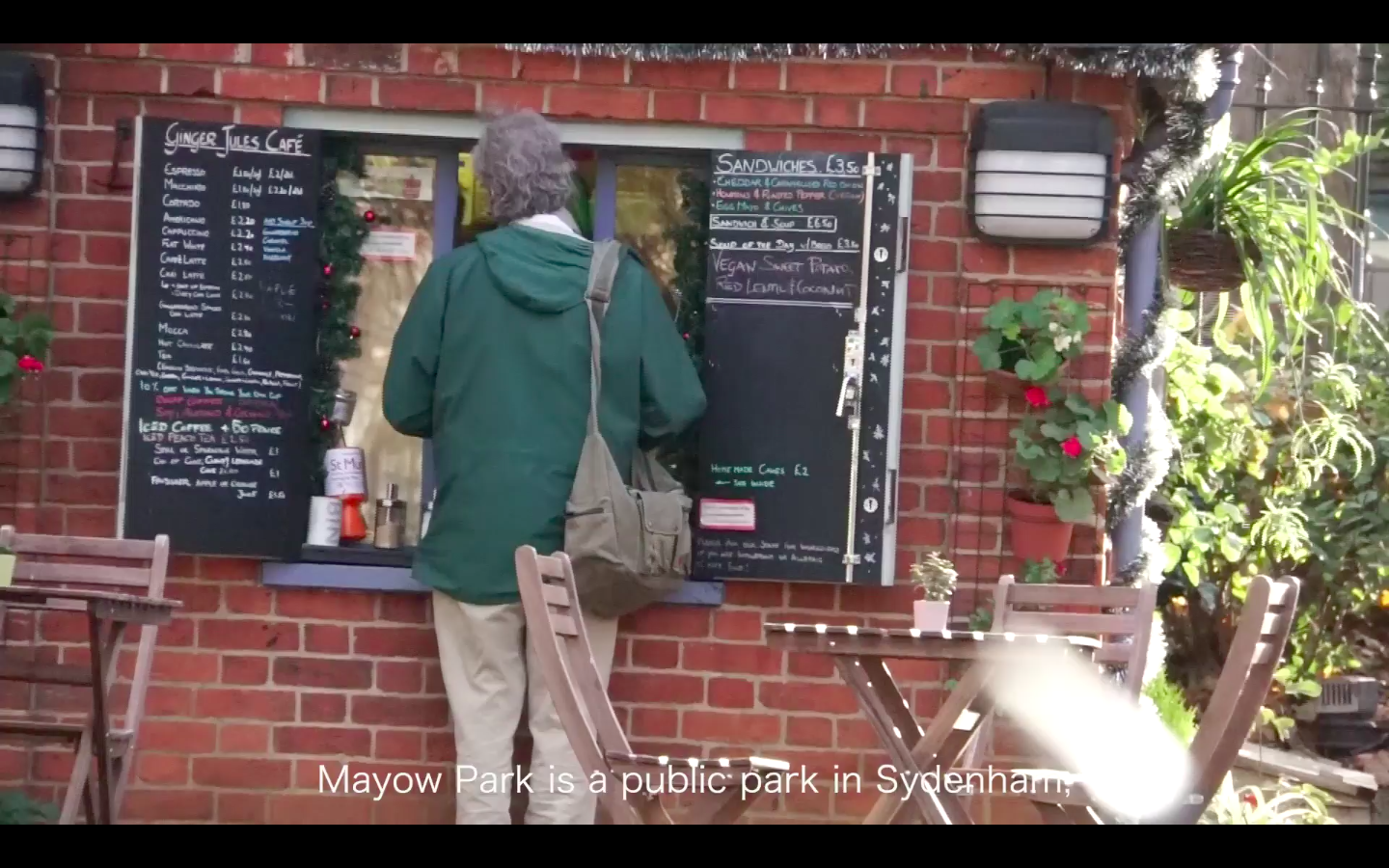OVERVIEW
User Research, Qualitative Research, Prototyping
3D Printing, Final Cut Pro
Oct-Dec 2017
London, United Kingdom
The aim of this study was to engage people into a community. Working in a team, we targeted community gardens and had designed a multi-device system, The-Leaves, which includes a Big-Leaf in the garden, inspiring people enjoy gardening, and Little-Leaves in the surrounding park, attracting people to visit the garden. The portfolio shows the part I participated the most in the user-entered design process.
PROCESS
#1 BRIEF
Followed the theme of CHI 2018 and its guideline: engage communities. Set the target community, goal, and deadlines.
#2 USER RESEARCH
Interviewed, observed and volunteered in the community, and analysed the stakeholders’ needs through the engagements.
#3 IDEA GENERATION
Came up with an final idea, the leaves, by rapid ideation, story boarding, wireframing, group discussions and creating the information structure.
#4 PROTOTYPING
Created both physical prototype, a 3D printed leave-like device, and video prototypes, demonstrating the interaction design.
#5 EVALUATION
Conducted Wizard of Oz method to test the prototypes in UCL campus.
USER RESEARCH
In our first meeting, our group came to an agreement that we are interested in environmental issue and art. Considered that green community would be easier to access, we contacted two community gardens in London: Grow Mayow Community Garden and Maryon Park Community Garden.
Interview
My group and I visited both community gardens to chat with the owners. After that, we conducted a couple of semi-structured interviews and volunteered in the gardens, to take part in the daily tasks.
Through the interviews, we formed a basic understanding about community gardens and the problem they were struggled with. Moreover, volunteered in the gardens, we got an insight by participated in the tasks, observed and interacted with the members.
First visit Grow Mayow Community Garden
Volunteer in Grow Mayow Community Garden
A.E.I.O.U. framework and analysis of Maryon Park Community Garden
A.E.I.O.U. framework
I led two discussions organising the information we’ve got. We categorised the keywords we noted down into Activity, Environment, Interaction, Object, and User, and linked their relationships.
We found that:
1 The gardens needed more fundings.
2 The gardens are well aware but not many people actually engaged.
They especially hoped to engage more young people.
Rapid sketching practice
Giant leaf-like device
I brought the ideas to the group meeting. We came into an agreement and combined our ideas into our first version of The-Leaves, which was a giant leaf-like device planted outside the garden, offered people chances to volunteer in the community garden, and make a quick donation. The leaf-like device would also be lit up in a little degree after someone engaged in the garden, showing the engaging progress of the day.
IDEA GENERATION
Based on user research results, we began the design process.
The design would be aimed to:
1 Raise the awareness toward the community garden in the surrounding park.
2 Engage more local people to the community garden.
I did several rapid sketching practices and had thought of interaction features, such as touch sensor, motion sensor, and gardening tools, that could be used in the physical interaction device we were looking forward to tackle the user’s need.
The sketching of a giant leaf-like device
Storyboards
Top When the garden owner is informed the she has a volunteer.
Middle When a jogger runs by the device. We noticed how people might not have the time to stop by while passing it through this storyboard, so we then adjusted the interaction design.
Bottom When a family notice the device.
Storyboard
Conducting the findings we saw and experienced outside the community garden, I created three storyboards with three senior often seen in the park. This helped me to form a more complete picture on what our device should be like.
Information Structure
The application was designed for garden visitors to register for volunteer works and make donations. With the wireframes made by other team members, I created the information structure of the application.
There were two features in this application:
1 Volunteer works registration and the feedback when the works were completed.
2 A quick donation process for the passerby.
The information structure of the application on the device
PROTOTYPING
Back Drafts of the physical prototype
Front Right Physical prototype with LED lights
Front Left The 3D blue print of the physical prototype
Physical prototype
Due to its complicated features, including a interface, buttons, and motion sensor light, we decided to skip a low fidelity prototype, and print a 1:1 Little-Leaf physical prototype instead, which the side with a screen would be the Big-Leaf’s prototype. We created the blue print with Tinkercad, and printed with white PLA.
We used iPhoneSE as the touchscreen, and controlled an LED wire manually as demonstrating the motion sensor light on the Little-Leaf, and the light-up interaction on the Big-Leaf.
Video prototype
To demonstrate our interaction design of the multi-device system, I made two video prototypes for user testing.
Task completion light-up
In our design, the Big-Leaf will light up when a user pressed the button after completing a task. I therefore filmed the light-up process, and added a photo of our group member as a scale. Also, showed the corresponded interface on the side.
Motion sensor light
This showed how the Big-Leaf echos a Little-Leaf’s sensor light. I filmed the light-up process of the physical prototype which was put behind bushes that would made it seems large and far away, and added the picture of the prototype in the front, illustrating the Little-Leaf.
Before pressing the complete button
After pressing the complete button
Before lights up
Both light up
Front Little-Leaf / Back Big-Leaf
VIDEO
The video is a summary of our project, including a brief introduction of the community garden at the beginning, the problem we tackled in, and highlights the main features of our devices. The two video prototypes are included.
Most of the scenes were filmed by one of the group members, and the video was edited by me.
Cover.
Introduction of Grow Mayow Community Garden and the surrounding park.
Interviews, which one of the owner of the garden shared her attitude towards the garden, and another owner illustrated the problem they were facing.
3D demonstrations of The-Leaves. This demonstrates the size of the devices and their location.
Motion sensor light video prototype.
Interface prototype.
This highlights the main features of the Big-Leaf, which provides opportunities for users to donate to the garden or do volunteer works.
Task completion light-up video prototype.



















